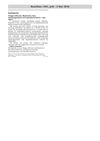 February 2021 in “Austin journal of nutrition & metabolism”
February 2021 in “Austin journal of nutrition & metabolism” Appropriate zinc levels may help prevent hair loss in university students.
[object Object]  August 2016 in “Journal of Investigative Dermatology”
August 2016 in “Journal of Investigative Dermatology” Zinc deficiency disrupts hair growth and cycle, but zinc supplements can fix this.
 47 citations,
January 2003 in “American Journal of Clinical Dermatology”
47 citations,
January 2003 in “American Journal of Clinical Dermatology” Mood stabilizers can cause serious skin reactions; careful monitoring and immediate treatment are crucial.
 2 citations,
May 2021 in “Case reports in dermatological medicine”
2 citations,
May 2021 in “Case reports in dermatological medicine” A 28-year-old man with type 1 diabetes had skin and hair issues due to zinc deficiency.
 December 2020 in “Skinmed”
December 2020 in “Skinmed” Zinc levels are not significantly different in people with hair loss conditions like Androgenetic Alopecia and Alopecia Areata.
 August 2024 in “Indian Journal Of Clinical Practice”
August 2024 in “Indian Journal Of Clinical Practice” A balanced diet and healthy lifestyle help manage PCOS symptoms.
 3 citations,
November 2020 in “Curēus”
3 citations,
November 2020 in “Curēus” A child's hair loss from alopecia areata was fully reversed in five months using diet and supplements.
[object Object]  1 citations,
November 2015 in “Lʹvìvsʹkij klìnìčnij vìsnik”
1 citations,
November 2015 in “Lʹvìvsʹkij klìnìčnij vìsnik” Correcting trace element imbalances may help reduce alopecia areata symptoms.
 1 citations,
January 2021 in “International journal of pharmaceutical research”
1 citations,
January 2021 in “International journal of pharmaceutical research” Low levels of ferritin, TSH, and certain vitamins are linked to hair loss in women of different ages.
March 2023 in “International Journal of bioprinting” Zinc/silicon-infused hydrogel helps regenerate hair follicles.
21 citations,
June 1983 in “Pediatric clinics of North America/The Pediatric clinics of North America” Zinc is vital for skin health and overall body functions, and deficiency can cause serious health issues.
 95 citations,
February 2018 in “Dermatology and Therapy”
95 citations,
February 2018 in “Dermatology and Therapy” Nutraceuticals may improve skin health and protect against aging, but more research is needed on their optimal use and possible health risks.
February 2021 in “INTERNATIONAL JOURNAL OF SCIENTIFIC RESEARCH” Low zinc and copper levels may indicate Telogen Effluvium.

Supplements improve health, appearance, and athletic performance.
 January 2024 in “Australasian journal of dermatology (Print)”
January 2024 in “Australasian journal of dermatology (Print)” A boy's hair turned red because of genetic mutations, not lack of zinc.
19 citations,
January 1974 in “Laboratory animals” Zinc deficiency in female rabbits causes poor health and reproductive issues.
 January 2024 in “Biochemical and Biophysical Research Communications”
January 2024 in “Biochemical and Biophysical Research Communications” Lack of zinc can cause hearing loss by damaging important parts of inner ear cells in mice.
 March 2016 in “Reactions Weekly”
March 2016 in “Reactions Weekly” A woman experienced hair loss, nail changes, bone marrow suppression, and low blood protein after taking azathioprine.
 November 2023 in “Journal of plant nutrition and soil science”
November 2023 in “Journal of plant nutrition and soil science” Boron deficiency in maize affects leaf boron levels and nutrient uptake differently depending on root hair presence and soil type.
 9 citations,
May 2005 in “Annales de dermatologie et de vénéréologie”
9 citations,
May 2005 in “Annales de dermatologie et de vénéréologie” Oral zinc and topical steroids can effectively treat chronic scalp pustules and hair loss in elderly patients.
 December 2022 in “Curēus”
December 2022 in “Curēus” Genetic testing confirmed a young girl has Atrichia with Papular Lesions due to mutations in the hairless gene.
 60 citations,
January 2014 in “Anais Brasileiros De Dermatologia”
60 citations,
January 2014 in “Anais Brasileiros De Dermatologia” Nanotechnology in dermatology shows promise for better drug delivery and treatment effectiveness but requires more safety research.
46 citations,
September 2011 in “British journal of dermatology/British journal of dermatology, Supplement” Effective dandruff treatment requires delivering antifungal agents to the scalp follicular infundibulum.
 August 2023 in “Tzu Chi Medical Journal”
August 2023 in “Tzu Chi Medical Journal” Iron deficiency is the main cause of hair loss in women, and iron supplements started within 6 months can improve hair health.
67 citations,
July 2011 in “Clinical, cosmetic and investigational dermatology” The document suggests a personalized treatment plan for alopecia areata based on the patient's age and hair loss severity, using a range of therapies ranked by effectiveness and safety.
 2 citations,
June 2011 in “Journal of clinical and experimental investigations”
2 citations,
June 2011 in “Journal of clinical and experimental investigations” Oral zinc sulphate is an effective and safe treatment for thallium poisoning, especially for skin and hair symptoms.
April 2015 in “Our Dermatology Online” Zinc supplements and diet changes can effectively treat zinc deficiency and prevent complications.
 September 2018 in “Journal of the American Academy of Dermatology”
September 2018 in “Journal of the American Academy of Dermatology” Elderly patients with CCCA were all African American with low vitamin D, but no iron or zinc deficiencies, and no hormonal imbalances compared to younger patients.
January 2020 in “Estetologia Medyczna i Kosmetologia” Most ingredients in anti-hair loss products lack scientific proof of effectiveness.
6 citations,
May 2022 in “Pharmaceutics” Zinc pyrithione dissolves quickly on the skin and in hair follicles, especially in smaller particles.





















